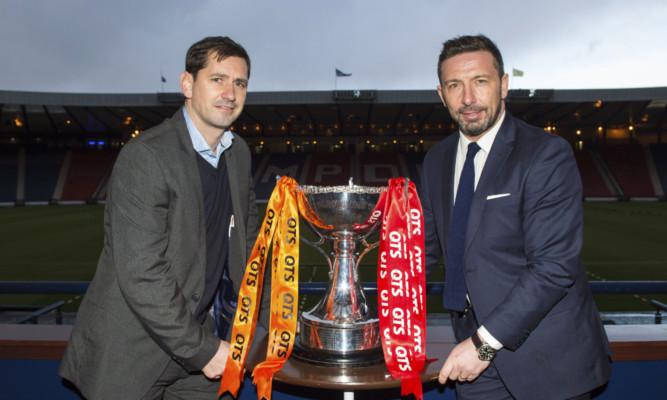Some might not know this, but Jackie McNamara when manager of Partick Thistle a few years back – co-wrote a sitcom with actor and ‘Still Game’ comedy writer Francis Gilhooley.
‘The Therapy Room’, partly based on the Dundee United boss’ experiences at the time, was turned into a pilot episode and was screened in an Edinburgh cinema as those behind the project sought to turn it into a series.
Sadly it wasn’t picked up, and these days McNamara is concentrating fully on football and specifically Saturday’s League Cup semi-final with Aberdeen.
It’s fair to say though that if McNamara was writing the story for this weekend’s encounter at Hampden, the ending would be a million miles away from what happened in May’s Scottish Cup final.
The Tangerines expected a fairytale finale to their Scottish Cup dream but it wasn’t to be as St Johnstone ran out 2-0 winners, denying McNamara his first trophy as a manager.
Now, tantalisingly close to a shot at silverware once again, it’s clear McNamara is not one for dwelling on the past and he is determined to steer United into another major cup final on Saturday.
“I had done ‘The Therapy Room’ before I had started doing my badges,” he explained, recalling his scriptwriting work.
“It was a sidetrack and I was doing it as a book.
“A lot of people do biographies or autobiographies and it was my way of doing certain things in a certain way I don’t believe you can do a biography without hurting people!
“Not if you want to be honest!
“It’s something I might go back to, and I have gathered a lot more material since then.
“I’ve certainly dealt with a lot more characters!
“It was escapism for me from dealing with a lot of stuff you don’t like dealing with in management.
“I still put little notes down, as I did as a player.
“But I don’t sit down and do scripts.
“It’s the same with team talks – everything I do or say before to the players or at half-time I don’t write anything down during the game.
“The stuff I don’t remember I don’t see it as important.”
As far as team talks go, the ones delivered by McNamara in Saturday’s eagerly-awaited New Firm derby could be the most important of the season so far.
And while he confirmed that he will give what many would consider a typical managerial address tomorrow at training, immediately before the game and at half-time on Saturday, McNamara revealed he likes to tailor his pep talks to individual players.
“As a player, a manager would go through the whole thing from the tactics board,” he explained.
“If he was talking to defence alone the midfield and forwards didn’t have his attention and spent that time looking at their boots.
“I try to get it so I’ve got their attention and know they’re listening, whether it be the two full-backs and who they’re up against, how the strikers should move or how the midfielder should move, and I’ll say other things collectively, such as if something is bothering me.
“It’s the way I like to do it.
“I liked that way as a player and you take certain things whith you.
“Whether that’s right or wrong, who knows, but that’s the way I like to do it.”
United’s away form has not been as consistent as their home record this term, prompting some suggestions that a trip to Glasgow for their semi-final might not suit the Tangerines as much as they would like.
However, McNamara insists that playing at a neutral venue should give neither side an advantage.
He added: “It’s a different thing altogether.
“When we came in two years ago we could not win at home we’d only won two games in the first bit of the season until when we came in, and the next game we won against Rangers in my first game.
“So it’s about trying to create an environment where there is no change playing home or away and that is about mentality.”
As revealed in yesterday’s Courier Sport though, United could be outnumbered by more than two to one at Hampden on Saturday with Aberdeen fans selling 18,000 tickets so far compared to United’s 8,000.
Both figures will inevitably rise upwards as Saturday approaches, but McNamara stressed he is unfazed about the prospect of a fairly partisan crowd.
“I’m not worried about that at all,” he concluded.
“Aberdeen have fantastic backing, they’re a one team city and have a backing because of what they achieved last year and the job Derek (McInnes) has done there and what he has done this season.
“It’s a bit less for us because we have two teams in the city and semi-finals have not been the most supported, but we still have a healthy crowd coming down.
“Hopefully we can send them back up the road happy and we’ll have greater numbers for the final.”
